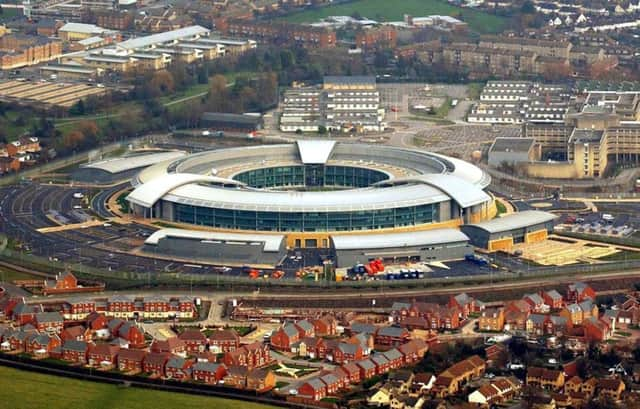SNP urged to be ‘liberal voice’ on surveillance


Duncan Campbell, an investigative journalist who first reported on the existence of the global ECHELON surveillance program in 1988, said there was a need to ensure the law was tightened to prevent the communications of MPs and MSPs being intercepted.
The Government will unveil the Investigatory Powers Bill, which will lay out the range of surveillance powers available to UK intelligence agencies and police, in the coming days.
Advertisement
Hide AdAdvertisement
Hide AdIt will replace a “mish-mash” of legislation which has proved out-dated in the wake of the WikiLeaks and Edward Snowden revelations on mass surveillance techniques used by Western powers.
The Investigatory Powers Tribunal ruled earlier this month that British spies were effectively free to record emails and phone calls made by MSPs after it ruled the Wilson Doctrine had no basis in law.
The doctrine, introduced by former Labour Prime Minister Harold Wilson, was introduced to protect the communications of MPs.
It was previously assumed the right had been extended to members of devolved administrations in Scotland, Wales and Northern Ireland.
“It was a policy statement by a prime minister and reaffirmed by successive prime ministers and that was its force,” said Campbell, who grew up in Dundee.
“It was never written into law. So I wasn’t entirely surprised when the investigatory powers tribunal, when asked in a preliminary ruling, ruled against it.
“Parliament, especially its Scottish contingent, now have an ideal opportunity to say: we shall make it a law. The more informed voices we have in the debate the better.
“We are about a week away from the announcement of a new draft investigatory bill to replace the mish-mash of previous legislation and unacceptable activities. We will then be into several months of discussions and parliamentary committee meetings about what these surveillance powers should be.
Advertisement
Hide AdAdvertisement
Hide Ad“The arbitrary way in which the agencies interpreted the doctrine - one year it included MSPs and then the next year it didn’t - shows just how vital it is to make laws to stop the agencies making up the rules to suit themselves.”
Campbell was one of three defendants charged with breaching the Official Secrets Act at the so-called ABC trial in 1978. He was arrested with fellow journalist Crispin Aubrey for interviewing a former corporal in signals intelligence and the trial was viewed as a test case for freedom of speech. Although found guilty, the presiding judge refused to jail them.
He has written several books on surveillance and his revelation of the ECHELON surveillance program was later confirmed by files leaked in 2014 by Edward Snowden, a former analyst for National Security Agency (NSA) in the US now living in exile in Russia.
Despite reporting on the subject for four decades, Campbell admitted he was taken aback by the scale of the Snowden revelations.
“What I and others were surprised by was that agencies were doing everything all of the time against everyone, “ he said.
“The story I broke in 1988 about the first mass surveillance system using computers was confirmed and turned out to be more accurate than I had any right to expect when you’re trying to break through big walls of secrecy. It proved how over the years agencies have been building these systems into the fabric of our society.
“Even people who are concerned about this issue and technically literate are still struggling to take it all in. I suspect there will be quite astonishing new stories from Edward Snowden for at least another year and a half.”
It is illegal to intercept domestic communications without a warrant signed by a Government minister, meaning the contents of an email cannot be read unless in exceptional circumstances.
Advertisement
Hide AdAdvertisement
Hide AdHowever, GCHQ can record the times of phone calls and emails and who they are made to.
“If there was an interest for example, of an MSP speaking to a lobbying group, and authorisation was given to pull that data from the database, then it would take a matter of minutes to do it,” said Campbell. “That is the danger of setting up this mass surveillance society in which everything is recorded even if there was no suspicion.”
Joanna Cherry QC MP, SNP spokeswoman for justice and home affairs, said: “The SNP recognises the need for law enforcement and security services to have access to the information they require in respect of the threat not just of terrorist offences, but of serious crime, such as the significant evil posed by child sexual exploitation. However, the SNP will always be vigilant to ensure that appropriate safeguards are put in place to balance the need to keep our communities safe with the need to protect civil liberties.
“The Tories seem determined to continue their assault on human rights on all fronts, and there are good reasons to fear some aspects of the Investigatory Power Bill.
“The SNP support the targeted and proportionate use of lawful intrusive powers but we are opposed to mass surveillance. A key issue is the protection of communications between parliamentarians and constituents, whistle blowers and campaigners. MSPs and MEPs as well as MPs must be protected by confidentiality. The Bill provides an opportunity to set minimum safeguards across the board and MPs must be given sufficient time to consider it.
“There will be measures in the Bill which impinge on devolved matters and the Scottish Government must be consulted in relation to such matters.”